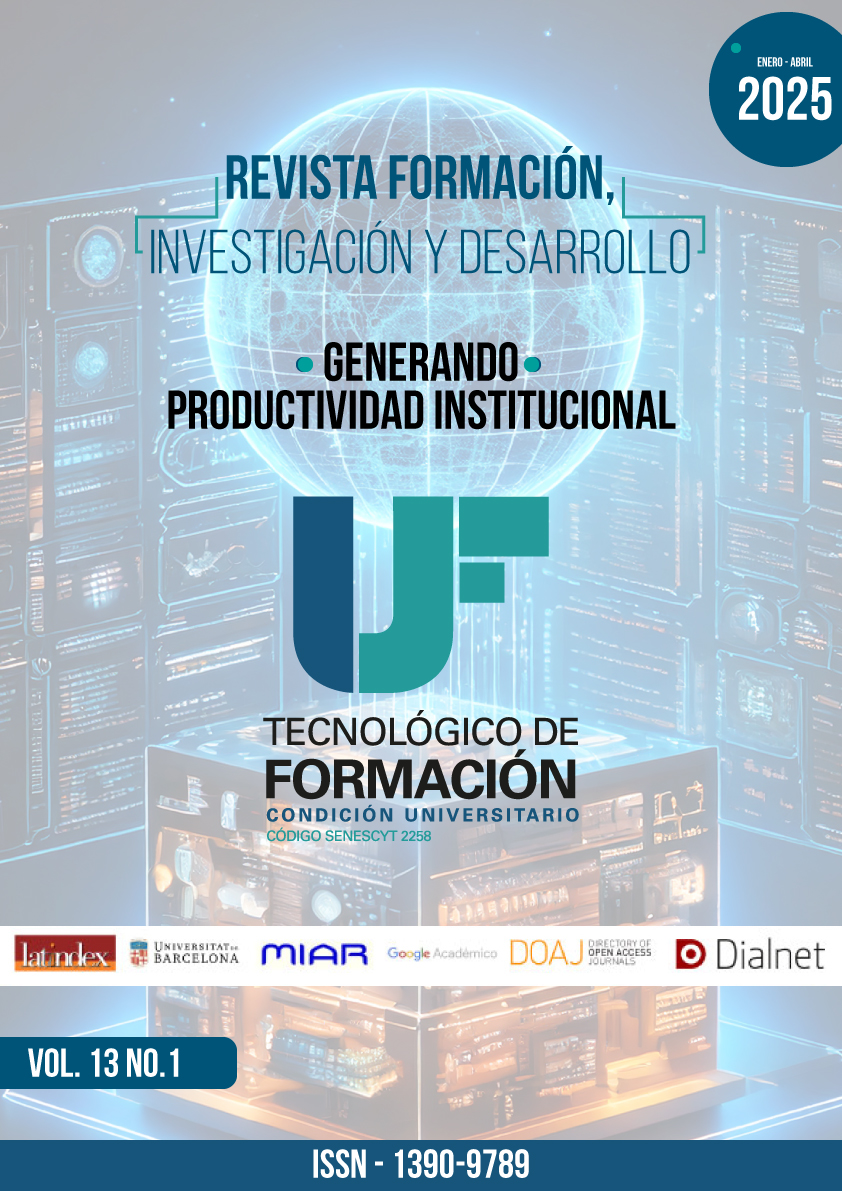Educación resiliente e inclusiva en crisis: Innovación Offline con Exelearning para garantizar la continuidad académica.
Contenido principal del artículo
Resumen
Este artículo explora la implementación de herramientas educativas offline, específicamente eXeLearning, para garantizar la continuidad académica en contextos de crisis, como apagones y desastres naturales. A través de un diseño cuasi-experimental aplicado a 165 estudiantes en modalidades en línea, híbrida y semipresencial, se evalúa el impacto de esta tecnología en el progreso académico y la entrega de tareas, destacándose incrementos promedio del 23.34% y 21.67%, respectivamente. La investigación subraya la capacidad de eXeLearning para mitigar las desigualdades educativas en comunidades con acceso limitado a la conectividad, promoviendo el aprendizaje autónomo e inclusivo. Asimismo, se integran estrategias pedagógicas innovadoras, como la gamificación y el aprendizaje basado en proyectos, con tecnologías avanzadas como la inteligencia artificial, lo que refuerza la personalización y la adaptabilidad en la enseñanza. Este enfoque no solo aborda las necesidades educativas durante interrupciones tecnológicas, sino que también fomenta competencias socioemocionales esenciales para la resiliencia educativa. Los hallazgos demuestran que combinar herramientas offline con metodologías pedagógicas inclusivas es una solución efectiva para garantizar el acceso equitativo a una educación de calidad, alineándose con los Objetivos de Desarrollo Sostenible (ODS). El artículo concluye destacando la urgencia de adoptar políticas educativas que prioricen modelos híbridos y tecnologías flexibles para enfrentar futuras crisis. Estos resultados abren nuevas perspectivas sobre cómo las herramientas offline pueden transformar la educación, asegurando continuidad y equidad en escenarios adversos.
Detalles del artículo

Esta obra está bajo una licencia internacional Creative Commons Atribución-NoComercial-CompartirIgual 4.0.
Este trabajo tiene licencia DE Atribución/Reconocimiento-NoComercial-CompartirIgual 4.0 Internacional. CC BY-NC-SA 4.0.
Cómo citar
Referencias
Al-Adwan, A., Alsoud, M., Li, N., Majali, T., Smedley, J., & Habibi, A. (2024). Unlocking future learning: Exploring higher education students' intention to adopt meta-education. Heliyon. https://doi.org/10.1016/j.heliyon.2024.e29544
Getenet, S., Cantle, R., Redmond, P., & Albion, P. (2024). Students’ digital technology attitude, literacy and self-efcacy and their efect on online learning engagement. International Journal of Educational Technology in Higher Education. https://doi.org/10.1186/s4123902300437y
Guzmán Jiménez, R., Escotto Córdova, E., Saldívar, Á., & Prem, D. (2022). SER0 Tawa Pukllay: sistema educativo remoto online/offline. Actas del Congreso Internacional de Ingeniería de Sistemas CIIS 2022: Entornos híbridos en la pospandemia: posibilidades para las nuevas tecnologías. https://doi.org/10.26439/ciis2022.6069
Hamad, F., Shehata, A., & Al Hosni, N. (2024). Predictors of blended learning adoption in higher education institutions in Oman: theory of planned behavior. International Journal of Educational Technology in Higher Education. https://doi.org/10.1186/s41239-024-00443-8
Hosman, L., Nova, R., Ahmed Mohammed Naji, O. A., & Alsaka, L. (2024). An Overview of Arabic Language Open Educational Resources (OER) for Primary and Secondary Education and Their Use in Offline Environments. The Electronic Journal of e-Learning (EJEL). https://doi.org/10.34190/ejel.22.9.3616
Lysytska, O., Mykytiuk, S., Chastnyk, O., & Mykytiuk, S. (2024). Foreign language teaching modes and adaptive methods in emergency education: Evaluation of first-hand experience. Multidisciplinary Science Journal. https://doi.org/10.31893/multiscience.2025069
Lytras, M., Serban, A., Torres Ruiz, M., Ntanos, S., & Sarirete, A. (2022). Translating knowledge into innovation capability: An exploratory study investigating the perceptions on distance learning in higher education during the COVID-19 pandemic - the case of Mexico. Journal of Innovation & Knowledge. https://doi.org/10.1016/j.jik.2022.100258
Moon, J., McNeill, L., Thomas Edmonds, C., Banihashem, S., & Norooz, O. (2024). Using learning analytics to explore peer learning patterns in asynchronous gamifed environments. International Journal of Educational Technology in Higher Education. https://doi.org/10.1186/s41239-024-00476-z
Muliaman, A. (2021). Efektivitas Model Project Based Learning Berorientasi eXeLearning dan Motivasi terhadap Hasil Belajar pada Materi Laju Reaksi. Jurnal Ilmu Pendidikan (JIP) STKIP Kusuma Negara Jakarta. https://doi.org/10.37640/jip.v13i1.956
Pietsch, M., Cramer, C., Brown, C., Aydin, B., & Witthöft, J. (2023). Open Innovation in Schools: A New Imperative for Organising Innovation in Education? Technology, Knowledge and Learning. https://doi.org/10.1007/s10758-023-09705-2
Rohmadi, M. (2021). Pemanfaatan eXe Learning Sebagai Media Belajar Dari Rumah Selama Pandemi Covid-19. Educatio: Jurnal Ilmu Kependidikan. https://doi.org/10.29408/edc.v16i1.3343
Siqiang, L., Kun, H., Quanlan, L., Jie, Z., Shumin, W., Li, H., Enzhong, L. (2024). Innovative integration of the “W+Flipped Classroom” and “B+BOPPPS” teaching models for enhanced learning outcomes. BMC Medical Education. https://doi.org/10.1186/s12909-024-06034-5
Walter, Y. (2024). Embracing the future of Artifcial Intelligence in the classroom: the relevance of AI literacy, prompt engineering, and critical thinking in modern education. International Journal of Educational Technology in Higher Education. https://doi.org/10.1186/s41239-024-00448-3
Wang, C., & Canagarajah, S. (2024). Postdigital ethnography in applied linguistics: Beyond the online and offline in language learning. Research Methods in Applied Linguistics. https://doi.org/10.1016/j.rmal.2024.100111
Xu, Z., Zhao, Y., Liew, J., Zhou, X., & Kogut, A. (2023). Synthesizing research evidence on self-regulated learning and academic achievement in online and blended learning environments: A scoping review. Educational Research Review. https://doi.org/10.1016/j.edurev.2023.100510
You, C., Awang, S., & Wu, Y. (2024). Bibliometric analysis of global research trends on higher education leadership development using Scopus database from 2013–2023. Discover Sustainability. https://doi.org/10.1007/s43621-024-00432-x
Yusuf, A., Pervin, N., & Román-González, M. (2024). Generative AI and the future of higher education: a threat to academic integrity or reformation? Evidence from multicultural perspectives. International Journal of Educational Technology in Higher Education. https://doi.org/10.1186/s41239-024-00453-6
Zhao, Y.-m., Liu, S.-s., & Wang, J. (2024). Application of data-driven blended online-offline teaching in medicinal chemistry for pharmacy students: a randomized comparison. BMC Medical Education. https://doi.org/10.1186/s12909-024-05701-x

